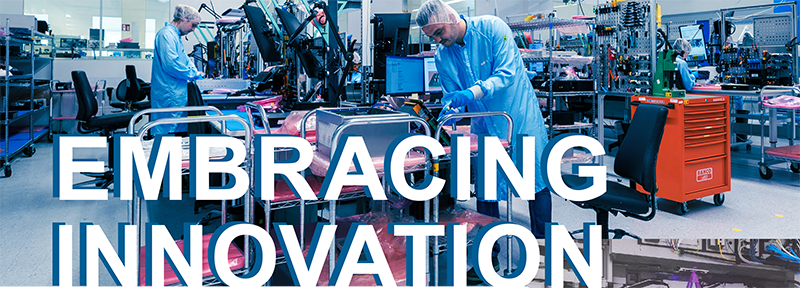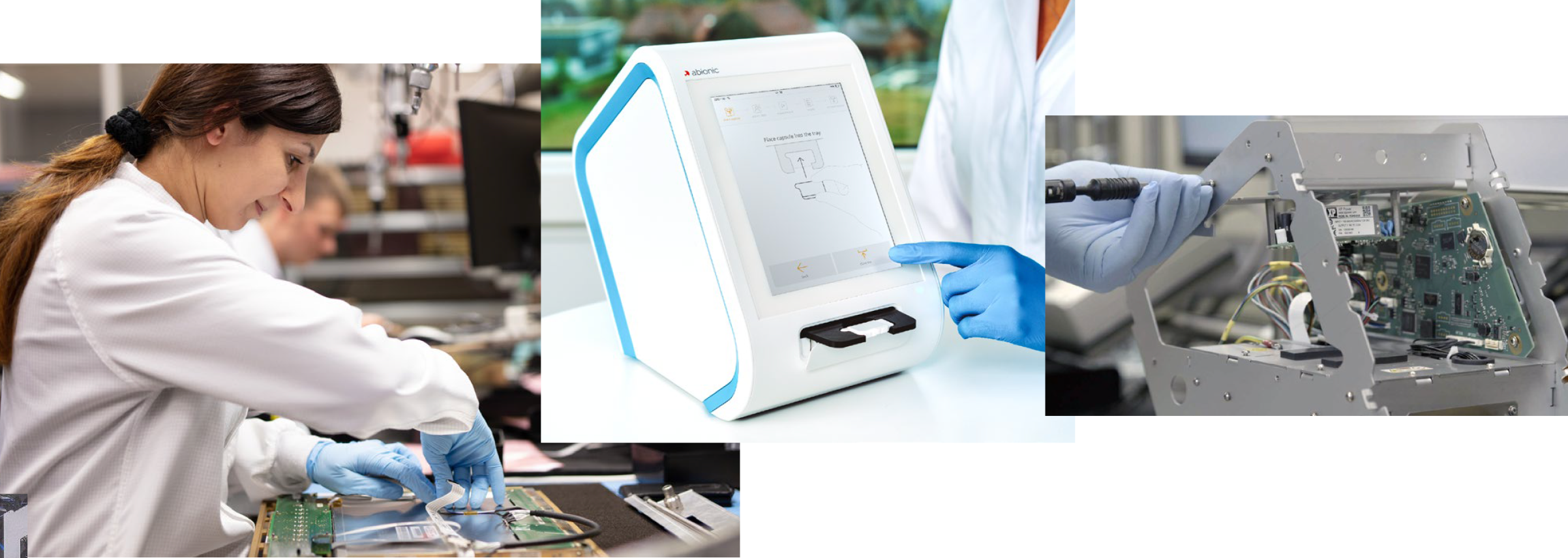
BENCHMARK ALMELO’S JOURNEY FROM DESIGN TO MANUFACTURE
The manufacturing sector is known for its blend of innovation, precision, and sustainability. The Benchmark Almelo facility is a clear example of how focusing on quality and innovation can guide a business from design to manufacturing. Benchmark Almelo’s commitment is evident in its partnership with the University of Twente’s publication, InnovatieNU. Together, we aim to highlight the critical design-to-manufacture process, promoting valuable conversations between students and industry experts on this vital topic.
Due in large part to our rich history and innovative spirit, Benchmark consistently demonstrates our ability to adapt to—and solve—complex challenges. Our expertise and experience provide us with the tools to meet the complex demands of several sectors, including medical technologies, commercial aerospace, complex industrials, defence, and semiconductor capital equipment. Our flexible solutions stem from this solid foundation and innovative mindset.
At Almelo, our design approach centres on purposeful innovation. We excel in crafting complex electronics, mechatronics, precision technology, and durable plastic designs, among other fields. Whether for startups, scaleups, or large corporations, our design for manufacturability (DFM) methodology goes beyond basic process optimisation, striking a careful balance between sustainability, cost efficiency, and global competitiveness.
A Vision Rooted in Global Technology Innovation
At Benchmark’s European Design Center of Innovation, our approach goes beyond traditional engineering. Drawing on Benchmark’s global expertise, this facility develops solutions to meet the growing demand for innovation and is recognised for its leadership in industrial design, applied research, and development services.
We discovered that external development teams often think the product is ready to manufacture if their prototypes are functioning. However, manufacturing readiness differs and begins with a 100% integrated approach. Early-phase technology and design decisions define 90% of the manufacturing costs. Christian Suurmeijer, a Global Technology Innovator (GTI Network) at Benchmark, supports existing and new customers in this early phase. Together with other GTI members and subject matter experts, we collaborate closely with our customers on the robustness and cost efficiency of new innovations. We help with conceptual product designs, along with innovative technology development and selection to support a smooth product realisation where uncertainties and risks are minimised.
In these early phases, our main principle is a fully integrated approach to product development. We’ve embedded this approach into our process, starting with our Creative Workshops. Our customers find these workshops deliver significant ROI, with development becoming more accelerated and focused. Successful, market-ready innovations strike a balance between end-user value, development, and manufacturing costs. Innovations must be manufacturable within the business case cost target and align with the company’s ESG goals to make sense.

A Partner in Progress— Sustainable Innovation
Besides cost and value, we have now integrated designing for sustainability and circularity. We use Life Cycle Assessments (LCAs), part design for reduced carbon emissions, and Design for “R” principles (repair, refurbish, remanufacture), but we also use new manufacturing digitalisation technologies from the Industry 4.0 pallet. Christian Suurmeijer leads this sustainable innovation competence, helping companies contribute to ESG goals. In our creative kickoff workshops, we can integrate sustainability with value engineering and technology design, ensuring we establish the best path forward. Both design for excellence (DFX) and Sustainable Innovation are realised in one run.
Reducing environmental impact is critical to modern manufacturing. At Benchmark Almelo, innovation should align with eco-friendly manufacturing practices using advanced software and applying our design for manufacturing (DFM) expertise. We’re leading the way in combining cost efficiency with environmental responsibility, showing that sustainable manufacturing is achievable and financially sound.
Our strategy includes design for test (DFT), automation, and circularity principles, essential for creating high-quality, sustainable products. We’re also constantly exploring modern technologies, such as augmented projection for work instructions and artificial intelligence (AI). These innovations improve operational precision, reduce waste, and support a more sustainable production model.
Our commitment extends beyond our operations, evidenced by our collaboration with platforms like the Fraunhofer Innovation Platform (FIP). This partnership allows us to share our insights to encourage wider adoption of sustainable practices among students, businesses, and industry peers.
The Almelo Difference – A Synthesis of Design and Global Manufacturing
Our ability to adapt and use resources across the global Benchmark network demonstrates our global strategy and focus on local excellence. The growth of our customers from small operations to global entities is proof of our dedication to collaboration and innovation, critical parts of Benchmark Almelo’s approach.
Beyond our technical skills and our focus on sustainability, what sets Benchmark Almelo apart is our problem-solving mindset and strong commitment to helping customers succeed. This was evident in our partnership with our customer, Abionic, where we turned a new Allergy and Sepsis testing method into a manufacturable and valuable solution, quickly (and effectively) addressing a global need. To support this type of startup/scaleup and large corporate incubators, we use our Almelo protolabs to accelerate industrialisation and enable early field and clinical testing. This service is specifically designed to produce a small prototype series in the initial stages of development.
Looking to the Future
Looking ahead, we’re taking advantage of new developments in design and manufacturing, focusing on digitalisation and AI. Our goal isn’t to “keep up” with industry trends but to help shape them. We want to make it clear to students and companies involved in InnovatieNU that the future of manufacturing is driven by innovation, sustainability, and collaboration. Through our efforts, we aim to inspire excitement about this future and encourage a new generation of engineers and entrepreneurs to innovate for a healthier, safer, and better-connected world and to create a brighter future.
We invite InnovatieNU’s readers to explore the many opportunities where design and manufacturing meet. By facing challenges head-on and developing novel solutions, we aim to create a future where innovation and sustainability lie at the centre of manufacturing excellence.
